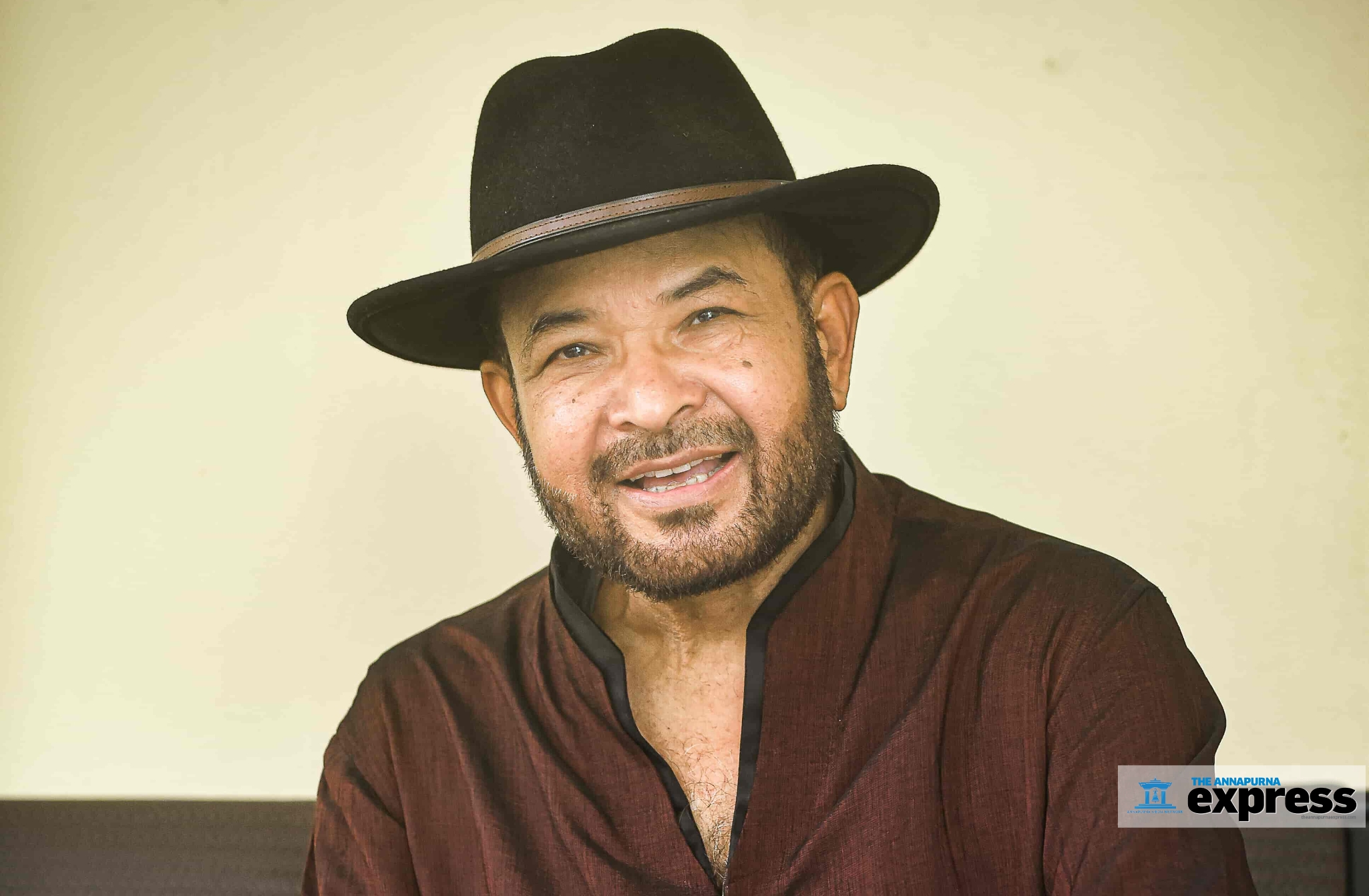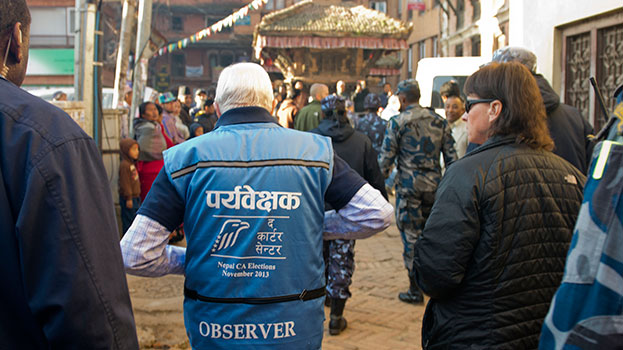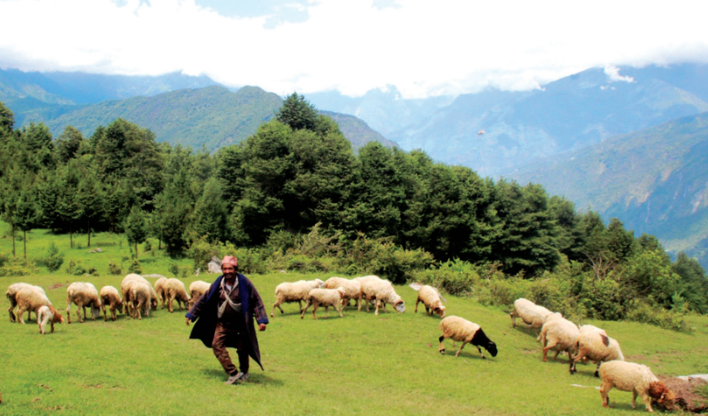Photo Feature: Off to the mystic Mohini Waterfall
The village of Markhu in Makwanpur is a popular destination for many folks in Kathmandu looking for a weekend getaway. The village overlooking the Kulekhani reservoir is nearly halfway between Kathmandu and Hetauda.
 One can easily find hotels and resorts here and there are plenty of things to do for visitors. Boating in the reservoir and hiking to Bheda Farm, a scenic pastureland, are two of the most popular activities. But many of them miss out Markhu’s hidden gem: Mohini Waterfall.
One can easily find hotels and resorts here and there are plenty of things to do for visitors. Boating in the reservoir and hiking to Bheda Farm, a scenic pastureland, are two of the most popular activities. But many of them miss out Markhu’s hidden gem: Mohini Waterfall.
 This week, I visited the famed waterfall with a friend of mine. It was a journey fraught with misadventures—bad weather, lost ways and jungle-walk after dark. But then we came across the majestic waterfall, which made our trip more than worthwhile.
This week, I visited the famed waterfall with a friend of mine. It was a journey fraught with misadventures—bad weather, lost ways and jungle-walk after dark. But then we came across the majestic waterfall, which made our trip more than worthwhile.
 We set out from Kathmandu on a scooter fairly late at around 12:30 pm, as it had been raining since early morning on the day of our journey. We reached Markhu at around 3pm via the Chandragiri route. (One can also take the alternative route from Pharping.)
We set out from Kathmandu on a scooter fairly late at around 12:30 pm, as it had been raining since early morning on the day of our journey. We reached Markhu at around 3pm via the Chandragiri route. (One can also take the alternative route from Pharping.)
 Weather was not the only thing that turned on us that afternoon. Our old two-wheeler betrayed us in several segments of the Kathmandu-Markhu ride. It could not pull our weight on inclines.
Weather was not the only thing that turned on us that afternoon. Our old two-wheeler betrayed us in several segments of the Kathmandu-Markhu ride. It could not pull our weight on inclines.
 In ideal conditions, Mohini Waterfall is about two-hour hike from Markhu. There is also the option for a 45-minute short hiking route. For this, one must take a motorboat across the reservoir and ascend a steep stone stairway.
In ideal conditions, Mohini Waterfall is about two-hour hike from Markhu. There is also the option for a 45-minute short hiking route. For this, one must take a motorboat across the reservoir and ascend a steep stone stairway.
 This was the route I and my friend took.
There is also a route for motorcycles, all the way up to the waterfall. One must cross the headwaters of the reservoir, usually impassable during the monsoon, to catch this route. But the two hiking trails are accessible around the year.
This was the route I and my friend took.
There is also a route for motorcycles, all the way up to the waterfall. One must cross the headwaters of the reservoir, usually impassable during the monsoon, to catch this route. But the two hiking trails are accessible around the year.
 We reached Mohini Waterfall late in the afternoon. The place was fairly packed despite not-so-promising weather. Visitors were soaking in the view, taking photos, swimming in the plunge pool and pitching tents for an overnight stay.
We reached Mohini Waterfall late in the afternoon. The place was fairly packed despite not-so-promising weather. Visitors were soaking in the view, taking photos, swimming in the plunge pool and pitching tents for an overnight stay.
 On our return trip, it began to rain heavily and we decided to take shelter at a nearby tea shop. It was already dark and the rain would not stop. We also missed the boat ride back to Markhu because it was already gloomy. So we took a long hiking trail through the forest with light from our mobile phone showing us the way. Soaking wet, we reached Markhu at 9:30 pm and rode our scooter back to Kathmandu.
On our return trip, it began to rain heavily and we decided to take shelter at a nearby tea shop. It was already dark and the rain would not stop. We also missed the boat ride back to Markhu because it was already gloomy. So we took a long hiking trail through the forest with light from our mobile phone showing us the way. Soaking wet, we reached Markhu at 9:30 pm and rode our scooter back to Kathmandu.
Mind Matters | Struggle with forgetfulness
Query
I am a 25-year-old student struggling with forgetfulness. I cannot remember the tasks I need to complete, people’s names and the conversations I have with them. This started last year. I cannot learn and understand new things and of late, I cannot even hold a conversation for long. I always have a mild yet persistent headache. I am afraid I might have some brain disease. I am terrified. What should I do?—A scared fellow
 Answered by Krishangi, Psychologist, Happy Minds
There can be several reasons for your forgetfulness, both mental and physical: lack of sleep, stress, or some form of mental illness. I suggest you start by going through your daily routine and identifying potential causes of your stress.
If you find no major stressor in your daily life, it is best that you get a thorough physical examination. To understand why you might be having these symptoms, I suggest you get a brain scan.
If the tests indicate no physical problem, we can be sure that this is a mental issue. Perhaps your sleep pattern is wrong, or you are having a tough time with your studies. We have to identify what is causing your symptoms in order to move ahead with treatment.
Check your surroundings for that. Maybe something is happening in your college, or among circles of friends and family, which is causing you stress without you realizing it. Again, we have to find the underlying cause first.
All the things I suggest above, they do seem like a lot. But you can take a step at a time. Start with something small, something easy. For instance, you can start by making improvements in your sleep pattern before moving to other steps.
If you feel like it is too much for you to follow these steps, get an accountability partner, a close friend or a family member, to assist you in this process. You can also reach out to a psychologist.
Answered by Krishangi, Psychologist, Happy Minds
There can be several reasons for your forgetfulness, both mental and physical: lack of sleep, stress, or some form of mental illness. I suggest you start by going through your daily routine and identifying potential causes of your stress.
If you find no major stressor in your daily life, it is best that you get a thorough physical examination. To understand why you might be having these symptoms, I suggest you get a brain scan.
If the tests indicate no physical problem, we can be sure that this is a mental issue. Perhaps your sleep pattern is wrong, or you are having a tough time with your studies. We have to identify what is causing your symptoms in order to move ahead with treatment.
Check your surroundings for that. Maybe something is happening in your college, or among circles of friends and family, which is causing you stress without you realizing it. Again, we have to find the underlying cause first.
All the things I suggest above, they do seem like a lot. But you can take a step at a time. Start with something small, something easy. For instance, you can start by making improvements in your sleep pattern before moving to other steps.
If you feel like it is too much for you to follow these steps, get an accountability partner, a close friend or a family member, to assist you in this process. You can also reach out to a psychologist.
Food habits: The one thing you can and must fix
Our environment has never been so toxic. There are many things working against us. Dr Keyoor Gautam, chairman of Samyak Diagnostic Pvt. Ltd., a pathology lab, says over 80 percent of those with fever are testing positive for dengue these days. Covid-19 is still a threat. Then there’s the trash dumped on the roadsides, giving off a foul stench and polluting the air, adds Dr Binjwala Shrestha, assistant professor at the department of community medicine at the Institute of Medicine, Tribhuvan University. Prevention aside—like wearing full-sleeved clothes to protect against pesky mosquitoes and masking up to stop the spread of Covid-19 and to save ourselves from the harmful effects of air pollution—we must also keep our immune system in top shape. One of the easiest ways to do that is by tweaking our food habits and eating right. “We can’t control external factors. But our diet is one thing we can fix. Our food choices also need to change with the seasons so that our bodies can adapt to the environment,” says Aarem Karkee, a dietician at Patan Hospital. The most basic thing we can do is eat at home and limit junk food and takeaways. In this hot weather, says Karkee, chances of dehydration, vitamin and mineral deficiencies, food poisoning and stomach flu are high. Eating at home drastically reduces that risk as we can control what goes into our food as well as ensure maximum hygiene. Then, we must also eat foods that are in season (for example, cauliflower, broccoli, cabbage, zucchini, bell pepper, and cucumber in summers) as these contain the highest amounts of water and nutrients. Our diet mostly consists of dal-bhat-tarkari. It’s generally what we eat throughout the year. The meal is laden with garam masala, ginger and garlic, all of which are heat-generating and thus not ideal for hot summer months. Anushree Acharya, dietician at Venus Hospital, Mid-Baneshwor, Kathmandu, says Kathmandu was once a lot cooler than it is today. Our staple diet was then ideal throughout the year. Not so now. She recommends cutting down on spices especially if you have digestive and sleep issues. “Have cooling foods like salads and other leafy vegetables. Include fruits like watermelon, papaya and pineapple in your diet. Curd is another great option to cool your body in this heat,” she says. It’s also not necessary to drink copious amounts of water. Bhupal Baniya, nutritionist at Nepal Police Hospital, says you must ideally consume 30 to 40ml times your body weight of water every day, which is roughly eight to 10 glasses. Many people tend to go overboard with their water intake, which is actually counterproductive. Overhydration can lead to as many problems as underhydration or dehydration—from electrolyte imbalance contributing to weakness and nausea to loss of water-soluble vitamins. Karkee says checking the color of your urine will give you a good idea of how much water you need. If it’s dark yellow or stains the toilet bowl, you need to drink more water. Whereas, if it’s transparent, almost like water, you need to cut down. In many parts of India, people mix sattu (roasted gram flour) with water, ice, black salt and lemon to make an extremely rehydrating drink to replenish lost electrolytes. Mint-infused or lemon water, Glucose-D, and even ORS can also be consumed on a daily basis to give your body that essential supply of electrolytes, says Acharya. Experts agree that people need to be conscious of what they are eating as that can have a profound impact on how they feel. This is especially important as your mind and gut are connected, determining your overall wellbeing. As the temperature continues to fluctuate, making the environment an ideal breeding ground for mosquitoes and all sorts of viruses, it’s become all the more important to give your body the internal boost it needs. And that can only come in the form of good, nutritious, season-specific food. Karkee’s advice is to consume whole foods in place of the polished, refined grains. Instead of white rice, he suggests brown rice or grains with the husk still intact. Replace your regular packaged dal with unpolished versions of the same from the local bulk store. Adequate consumption of fruits and vegetables can help regulate your body temperature and digestion, two crucial aspects for the system’s proper functioning. There is also no need to be hyper conscious of your salt intake unless you suffer from conditions that require you to monitor it. Our diet, he says, is deficient in iodine. Iodine deficiency can lead to growth and development issues in children as well as pregnancy-related problems in adults. The salt we consume is fortified with iodine and should be considered a dietary requirement. “There is actually no need to swap your regular salt with pink salt and such. In fact, I suggest you don’t,” he says. The crux of ‘beating the heat’ and being your fittest, healthiest self lies in what’s happening in your kitchen. Keeping a food journal—where you jot down everything you eat and drink—can help you get a sense of what you are doing wrong and fix it. Even better, take a photo of everything you eat and review it at the end of the day or week. Dr Shrestha says the key to eating right is understanding your food habits. That way you will be better attuned to the signals your body gives out when something isn’t working for you.
TRC bill stirs up a hornet’s nest
Despite objections from the conflict victims, the international community, and the main opposition CPN-UML, the government seems intent on endorsing the bill to amend the Enforced Disappearance Enquiry, Truth and Reconciliation Commission Act 2014. The bill was tabled in Parliament on August 23. The rights activists see the new bill are designed to grant amnesty to those involved in serious human rights violations, torture, and rape. It incorporates terms like ‘murder’ and ‘cruel murder’, ‘torture’ and ‘cruel torture’ without clearly defining them. The vague definitions could be just the loophole that allows perpetrators of these crimes to get away scot-free. The main opposition has flatly rejected the bill, stating that such erroneous provisions should be corrected. After objections from conflict victims and the international community, preparations are underway to form a cross-party committee to address the concerns. The ruling coalition seemingly wants to fast-track the bill’s endorsement to take credit ahead of the November elections. Also Read: Is PM Deuba attending UNGA? Prime Minister Sher Bahadur Deuba held related talks with CPN-UML Chairman KP Sharma Oli on August 23. In the meeting, UML conveyed that it is ready to lend support for timely conclusion of the peace process but that the bill should be amended. “We advised the prime minister to listen to the concerns of all stakeholders and not to take decisions in a hurry,” says UML leader Subash Nembang. Of late UN’s Resident Coordinator Richard Howard and ambassadors of the US, European Union, Germany and Switzerland have been meeting top leaders of major parties to express their concerns over the bill. They also met Oli on August 24 to voice their opposition against amnesty for serious human rights violators. The international community, however, has not made its position public. “The provisions of the new bill are unjust and we cannot accept it in its current form,” says conflict victim Suman Adhikari. “Murder and torture are grave human rights violations. There is no question of a murder being ‘cruel’ and ‘non-cruel’, unlike what has been provided in the bill.”



















